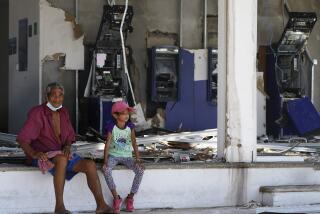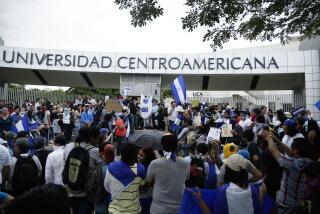Angelenos Send Help to Battered Nicaragua : Disaster: Central American immigrants pour into consulate with donations of food, clothing and cash for victims of tidal waves.
- Share via
Margarita Valle does not know anyone who lives near Nicaragua’s tidal wave-devastated Pacific coast. In fact, the Salvadoran immigrant has never visited the coastal villages south of her native country.
But as she carried armload after generous armload of diapers into a disaster relief center, she joined scores of Central American immigrants and other Angelenos who are responding to news of Tuesday night’s disaster with clothing, bags of food and cash donations.
For Valle, the diapers were particularly heartfelt gifts. She and her husband, a car painter, spent the $300 they had long been saving to take their four children to Disneyland.
“All I hope is that someday, if something happens to me and my children, we will be helped,” Valle said.
Cesar A. Aviles, consul general of the Nicaraguan Consulate in Los Angeles, said seven phone lines to his office have been jammed since Wednesday morning with calls from frantic local residents seeking information about deaths, injuries and damage in their home country.
Aviles and workers at several agencies that aid Central American immigrants also fielded scores of calls from those with families in Nicaragua and from people asking how they could help.
A magnitude 7.0 earthquake at sea sent tidal waves up to 30 feet high sweeping over a 200-mile swath of Nicaragua’s coast, killing at least 120 people and injuring 157. Another 102 coastal residents are missing and about 3,680 have been evacuated, according to official information Aviles said he received Thursday morning. Although damages are still being assessed, about 10,000 have been left homeless.
“People need to know that all the damage is located along the shoreline. There was no damage to the main cities or in Managua,” said Aviles, who was to meet late Thursday with local Red Cross officials to coordinate relief efforts.
“At this time international help is needed because of the lack of resources within our government,” Aviles said, adding that cash donations, medical supplies, baby food, diapers and canned food are needed.
The consulate did not have the names of dead and injured Thursday, but Aviles said his office will release the information when it becomes available.
Throughout the day Thursday donors streamed into the consulate with bags and boxes stuffed with food and clothing. By noon one room of the office at 2500 Wilshire Blvd. was nearly filled with goods.
Los Angeles is home to about 310,000 Central Americans, according to the 1990 census, an immigrant community that is heavily concentrated in the Pico-Union section of the city, not far from the consulate.
At another relief site, at 636 S. Plymouth Blvd., a group of 15 women with a nonprofit Nicaraguan aid group called From USA With Love packed donated food and clothing in a garage as carloads of supplies were dropped off.
Aviles and Mina Nelson of From USA With Love said they were working Thursday to arrange shipment of the goods through airlines, including Aviateca, which was donating space.
Many with relatives in Managua, about 75 miles northeast of the quake’s epicenter, said they spent a sleepless night Tuesday trying to reach loved ones over jammed phone lines.
“I just started crying when I saw the devastation on the news,” said Maritza Vega Gentry, 42, who continually dialed her cousin’s phone number in Managua until making contact at 3 a.m. Wednesday.
“Thank God they were OK,” said Gentry, as she sorted clothes in the garage. “But we didn’t know at that time that the damage was only on the coast. Even though I left Nicaragua when I was 14, a tragedy in that country still touches me.”
Many said they wanted to help the poor who live along the coast. Although middle- and upper-class Nicaraguans own vacation houses near the coast, most of the year-round residents live in huts and ramshackle buildings and make a living by fishing, farming or caring for the vacation homes of the affluent.
David Sanchez, 22, of Azusa took a day off work to volunteer at the consulate, helping sort donations.
“I just wish I could do more to help my people,” said Sanchez, who has lived in the United States for 14 years. “Maybe over here my little grain of sand will somehow help out.”
Sylvia Meitzenheimer, 22, who left Managua only 11 months ago, stuffed her own baby’s food into a metal cart and walked to the consulate from her Pico-Union area apartment.
After dropping off her donation, she burst into tears, saying she was overcome by television footage of a dead child.
“We’ll find a way to buy more food,” she said. “The people in Nicaragua have nothing.”
More to Read
Sign up for Essential California
The most important California stories and recommendations in your inbox every morning.
You may occasionally receive promotional content from the Los Angeles Times.












